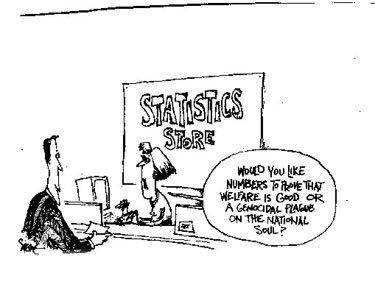Bookworm explains how the standard leftwing arguments for socialized heathcare featuring negative comparisons of the United States with allegedly superior and more enlightened other countries rest upon statistics which dissolve like fairy gold upon examination.
It all began when my son expressed dismay at data from his AP Environmental Science text-book:
In 1900 the U.S. infant mortality rate was 165. In 2011 it was 6.1. This sharp decline was a major factor in the marked increase in U.S. average life expectancy during this period. The United States ranks first in the world in terms of health care spending per person, but 54th in terms of infant mortality rates.
(G. Miller, Scott Spoolman, Environmental Science, p. 100.)
My son didn’t want to believe that America, which he thinks is a great country, could rank so low in something as basic as infant mortality. As it happens, I knew that those numbers were wrong, so I immediately spoke up. I got as far as saying “Those numbers are wro…†when a far-Left physician in the room literally shouted me down.
“This is not political. We don’t need to hear any of that right-wing crap. You’re going to turn this in a political argument. This is science.†The other guests looked stunned.
I tried again. “I’m not talking politics. This is about statistics. You need to know that….â€
Again, the Leftie physician cut me off. “Little Bookworm, don’t listen to her. She’s just going to go on with her political crap. The problem is with the U.S. medical system.â€
I tried again. “Let me finish. This is a statistical problem.â€
Leftie cut me off again. “No, don’t go there.â€
I ignored him and went there anyway. “Stop!!!†I hollered at the top of my lungs. The room fell completely silent. I finally had my say.
“The problem with any analysis that ranks the U.S. so low when it comes to infant mortality is that different countries have different ways of determining what’s a ‘live birth’ for purposes of calculating infant mortality statistics. The U.S. is one of the few countries in the world that counts any baby born alive, no matter how fragile it is, as a living baby for infant mortality purposes.
“In other countries, such as Korea or places in Europe, they only count babies that are a certain size or weight as ‘live births.’ Comparing U.S. numbers with other countries’ numbers is an apples and oranges comparison unless you adjust for the differing baseline of what constitutes a live birth. The study cited in the book is garbage in-garbage out.â€
Read the whole thing.






GoneWithTheWind
There are a couple of critical factors that don’t make it into the discussion when the birth survival rates are calculated. In France for example a new born is not counted as being “alive” until it is one month old. That is if it dies at age 29 days it is counted as a still birth and not counted in the baby survival stats. In many countries data collection is so bad that the government simply fills in the data as they want it to be. And in some countries their pride comes first and they outright lie about the data to make their country look good.
Another factor is the American drug culture and alcohol use in the hood. Because of this a black fetus is at a disadvantage that no amount of health care spending can fix. The harm that drugs and alcohol do in this country is incredible and of course or stats reflect this. BUT the stats are open to interpretation and every special interest group interprets them in a way to favor their agenda. Her is the solution to lowering infant mortality rates in the U.S.: stop welfare which encourages teen pregnancy. Require parents to make their children attend school and do their homework. Take the war on drugs seriously and do the things that will eliminate the use of hard drugs.
T. Shaw
Numbers don’t lie. Statisticians do.
There are liars. There are damned liars . And, there are statisticians.
SDD
Please don’t damn statistics. Damn those who are too lazy to understand them. My current favorite is the use of “household income” to supposedly show that people are earning less money than they have before. What nobody seems to bother to look at (and it’s not that difficult) is what’s happened to household size. It’s been shrinking for quite some time. That means there are fewer earners in the household (on average) than there used to be. To choose a simple example, if Dick and Jane divorce, household income drops — even though nothing else (economically) has happened. The other factor affecting household income is non-cash compensation. If you take $1 less in cash income and get $1.50 in medical benefits, are you earning any less? The household income numbers say you are. And the third factor is welfare benefits. Say, you’re in Seattle earning $10/hour. The City Council prices you out of job with their minimum wage law. So you opt for the generous welfare benefits they have in that city. Now, you’re actually better off economically, even though household income stats say you’ve had a drastic cut in income. And you probably are now kicking yourself for being a fool and working in the first place.
People like Hillary Clinton and Bernie Sanders know exactly what I just pointed out. It’s just to their advantage to ignore it. People who work in “journalism” are just too lazy to do the work to understand it. And they probably never took a course in economics or statistics in their life anyway.
Please Leave a Comment!